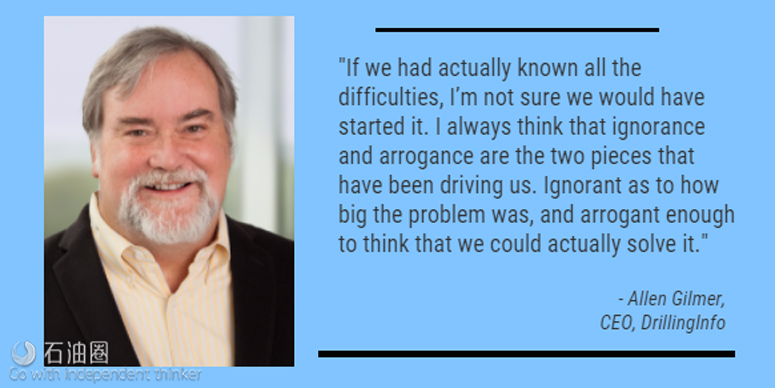At the turn of the century, Allen Gilmer and two fellow oilmen started a business to answer the questions that drive others in the field: where to drill, and with what, where, when and how. Having found access to the solutions, Gilmer now leads a global business with a team of 500.
DrillingInfo gathers, synthesizes and delivers information through a system built it across a non-linear, multi-variant engine packet of core, and that allows their software to integrate data, Gilmer said.
“One of the [venture capital firms] that didn’t fund us said he finally figured out what we do. He said we’re dogs selling dog food to other dogs,” Gilmer said. “Frankly, that’s exactly the kind of things we all think about. We’re all oilmen and we know that raw data means a whole lot of work to even get into position to even ask it a question. Really, for us it was how to build a system that was very holistic that you could ask it any sort of question about the business and be able to get a viable answer.”
Rigzone: How did you make the decision to start your own business?
Gilmer: Since leaving Marathon Oil Corp in 1993 to become an independent producer, I have always ‘eaten what I killed.’ With regard to Drillinginfo, it came about because I needed it as a producer. We founded the company as people that wanted the product.
We collect hundreds of different types of pieces of information, both regulatory and proprietary, globally, and really have built a whole model of the oil and gas industry that keeps a daily pulse. So it’s kind of like a state of the industry, so to speak, looking at lots of different parameters.
We have clients that use it to help figure out how to frack wells better; we have clients that use it to figure out what the markets look like; and on the oilfield service side, where should they be anticipating build-ups in drilling activity … all the way up to policy decisions with regard to what’s the forward hedge price of oil going to look like. We’re pretty ubiquitous and in lots of different places in the industry.
Rigzone: What is your client base?
Gilmer: A little more than 51 percent of them are E&P companies. The rest are oilfield service companies, the financial services businesses, the regulatory agencies, and some others.
Rigzone: What were the challenges?
Gilmer: Government bureaucracies were a big one. When we originally started, we used purely regulatory data. The agencies looked at us as competition. We also had to scale up operations into multiple states – each and every one with their own flavor and foibles. We had to figure out how to serve thousands of people on a rich database and application basis and scale that user experience at the same time. We had to learn to love process – a tough call for a bunch of wildcatters.
As we started off, I think the bigger companies looked at us as a primary data provider as opposed to an analytics or technology provider, whereas some of the smaller folks saw the full value. As time went on, there was perceptions of what we were to these companies and they didn’t realize the full capability of what they actually have.
It’s every human being. We all create our own work flows into how we approach things, and sometimes we don’t lift our heads up and look around. We don’t realize there’s ways of end-around those work flows completely, and that’s what we’re really good at doing is figuring out how to end-around very laborious work flows. I call it using a Ferrari as a flower pot. You can use it as a flower pot, it’s just not the best use of a Ferrari.
It’s one of those businesses … if we had actually known all the difficulties, I’m not sure we would have started it. I always think that ignorance and arrogance are the two pieces that have been driving us. Ignorant as to how big the problem was, and arrogant enough to think that we could actually solve it.
Rigzone: Were there any surprises along the way?
Gilmer: That it would be hard to get people to think of data an analysis in a different way. When we started, literally no one used data to drive new ideas. They used data to validate ideas. We got into a supermajor because they missed a well drilled one legal location off their lease line. By the time they found out – from a Drillinginfo user – they calculated they had been drained of some $250 million in value. They didn’t take Drillinginfo for the data – they already had permits and production – they took us for what we did with that data.
Rigzone: In what way would it be different to start your business today compared to 17 years ago when you started DrillingInfo?
Gilmer: It is a completely different world today, hopefully driven by what we take for granted today from Drillinginfo. Our ‘minimum viable product’ in 2000 couldn’t be given away today. The barriers to entry are much higher. We identified a brand new way of analyzing and interacting with data and were able to enter the market and grow though that unique differentiation. We couldn’t start Drillinginfo today without a much bigger budget or a more niche focus.


 石油圈
石油圈

